by
Nancy Ryerson, Staff Writer | September 01, 2013
From the September 2013 issue of HealthCare Business News magazine
Historically speaking, pediatrics is the baby of medical disciplines. When the American Pediatric Society formed on September 9, 1887, the country’s first two pediatric hospitals, in Philadelphia and Boston, had opened only a few decades before. The first dedicated children’s hospital in the world, located in Paris, was established in 1802.
Yet, the relative lack of care available for children wasn’t from lack of a need for it. In the latter part of the 19th century, infant mortality in the United States stood at 200 per 1,000 births. Epidemics of scarlet fever and diphtheria, along with a serious form of diarrhea, were often fatal. And there was little legally in place to protect children from working long hours in harsh conditions or from the corporal punishment they often received from their parents.
Though childhood is viewed today as a distinct part of the human lifecycle, children were generally treated simply as small adults up until the late 19th century. As such, they visited the same doctors as their parents and received similar care. Although some early medical texts covered children’s health, such as the Italian volume “Little Book of Diseases” from 1472, methods and concerns specific to the treatment of children were largely left out of health literature and training.



Ad Statistics
Times Displayed: 656
Times Visited: 5 Fast-moving cardiac structures have a big impact on imaging. Fujifilm’s SCENARIA View premium performance CT brings solutions to address motion in Coronary CTA while delivering unique dose saving and workflow increasing benefits.
Dr. Abraham Jacobi, a German pediatrician, is considered to be the father of pediatrics in the United States and was the American Pediatric Society’s first president. He established the pediatrics chair at the New York Medical College in 1861 and was the founding publisher of several pediatric journals. He also taught doctors and parents about children’s hygiene and feeding.
When the American Pediatric Society was formed in 1887, it was the first medical specialty society in the U.S. Job Lewis Smith, who was chairman of the pediatric section of the International Medical Congress, formed the group with a few colleagues to create a forum for discussing pediatric issues and clinical problems. From there, conditions began to improve for U.S. children. By the last quarter of the 19th century, doctors and scientists had developed a better understanding of the sources of illness. In the 1880s, doctors were encouraged to put silver nitrate in newborns’ eyes in order to prevent blindness. An 1897 New York law mandated children be vaccinated against smallpox.
One of the most significant child health problems during the 1800s was lack of access to safe milk. In 1893, New York philanthropist Nathan Straus established the first milk stations for the poor. The stands successfully decreased infant mortality caused by “summer diarrhea.”

